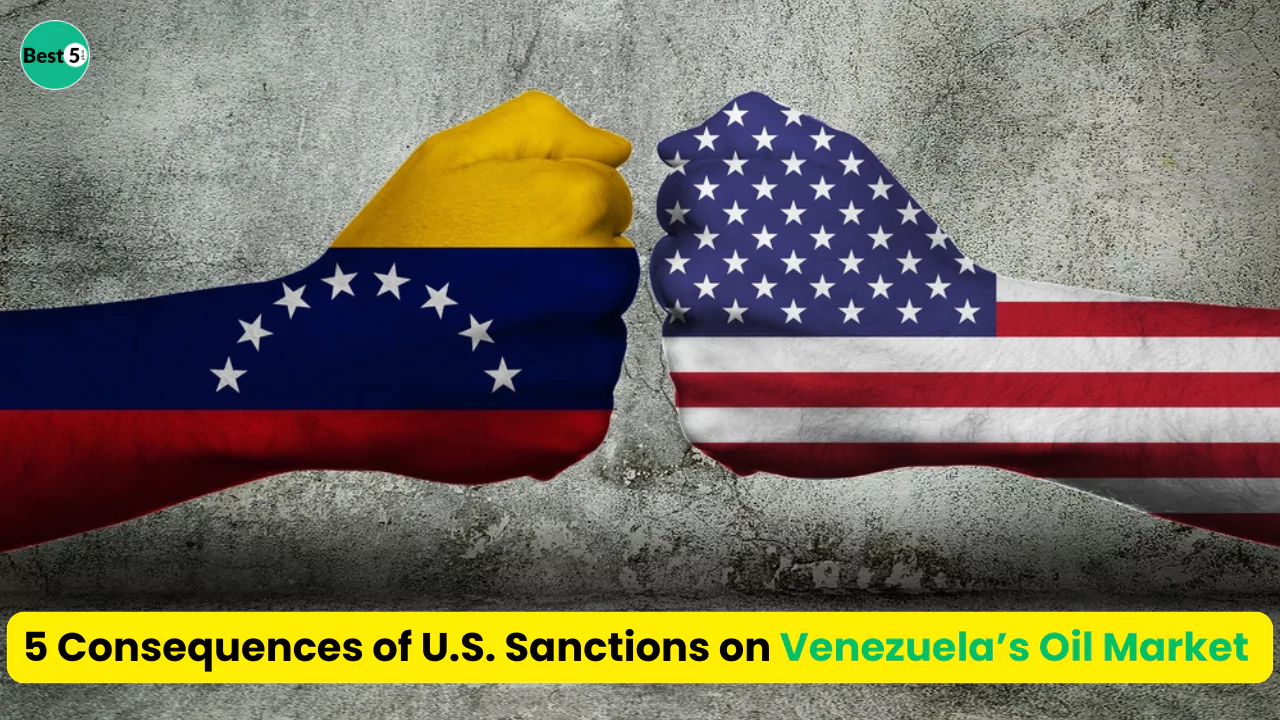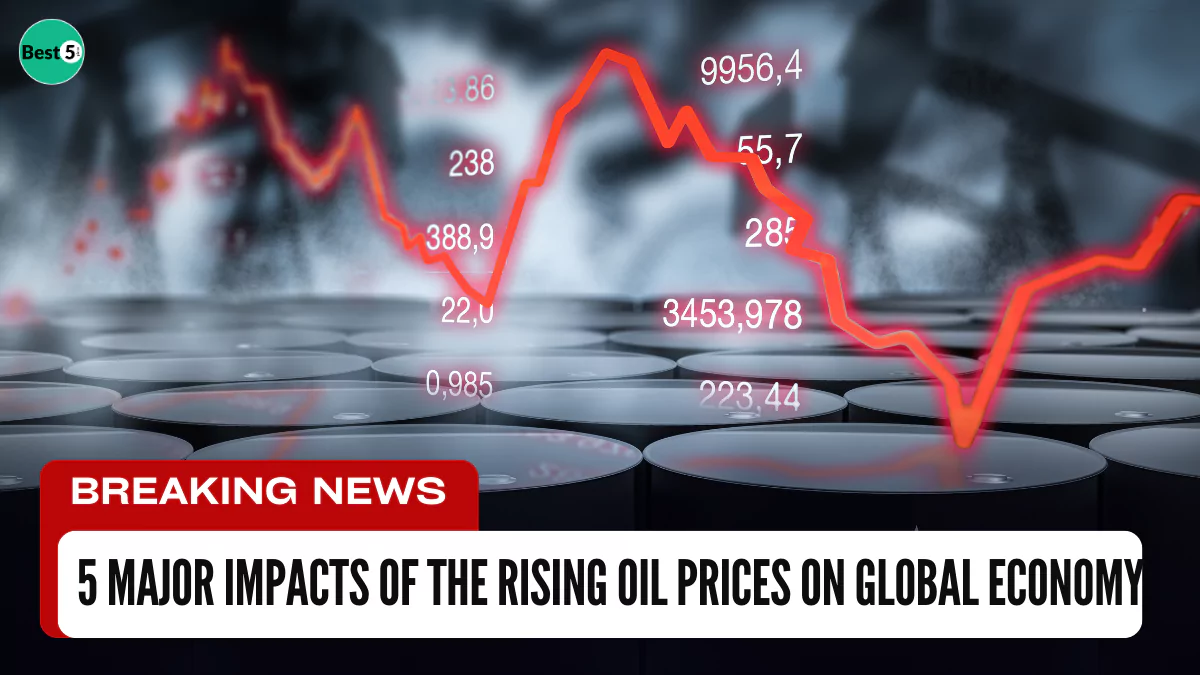The consequences of U.S. sanctions on Venezuela’s oil market are not only reshaping the Latin American nation’s economy but also influencing global energy dynamics. Since Venezuela holds one of the world’s largest proven oil reserves, Washington’s restrictions on its exports have had far-reaching effects.
For years, oil has been the backbone of Venezuela’s economy. However, the U.S. sanctions imposed over political and human rights concerns have severely limited its ability to trade freely in global markets. This has led to economic hardships at home, shifts in OPEC strategies, and even fluctuations in U.S. gas prices.
In this article, we will break down five major consequences of U.S. sanctions on Venezuela’s oil market. Each consequence highlights a mix of economic, political, and energy-related outcomes that continue to reverberate across borders.
1. Consequences of U.S. Sanctions on Venezuela’s Oil Market: Decline in Energy Exports
Key Features:
- Sharp reduction in Venezuela’s crude oil exports.
- Limited access to U.S. refineries that once processed heavy crude.
- Increase in shadow trade through alternative buyers like China and India.
- Severe revenue losses for the Venezuelan government.
The first and most direct consequence has been the decline in Venezuela’s energy exports. Before sanctions, Venezuela was a major supplier to U.S. refineries, particularly for its heavy crude. Once sanctions took effect, these refineries had to find alternative suppliers, leaving Venezuela cut off from one of its largest markets.
To survive, Caracas turned to other buyers, including China and India. However, these trades often happen at discounted prices or under secretive arrangements to bypass restrictions. As a result, Venezuela’s oil revenues have fallen sharply, crippling its national budget and limiting its ability to invest in infrastructure.
2. Consequences of U.S. Sanctions on Venezuela’s Oil Market: Impact on OPEC Dynamics
Key Features:
- Weakened influence of Venezuela within OPEC.
- Reduced ability to meet assigned production quotas.
- Greater reliance on stronger OPEC members like Saudi Arabia.
- Tensions within the group over production adjustments.
OPEC, the Organization of the Petroleum Exporting Countries, relies on its members to maintain stability in global oil markets. Venezuela, once a powerful voice within OPEC, has seen its role diminish. Its inability to meet production quotas has reduced its bargaining power, leaving countries like Saudi Arabia and the UAE to shoulder more responsibility.
This imbalance has occasionally created friction within OPEC, particularly when adjusting production targets. Venezuela’s weakened position has also opened the door for outside players, such as Russia, to exert greater influence in the broader OPEC+ framework.
3. Consequences of U.S. Sanctions on Venezuela’s Oil Market: Effect on U.S. Gas Prices
Key Features:
- Reduced supply of heavy crude to U.S. refiners.
- Increased reliance on Canadian and Middle Eastern imports.
- Higher costs passed down to U.S. consumers.
- Gasoline price volatility during global disruptions.
For U.S. consumers, one of the most noticeable effects of the sanctions has been at the gas pump. Venezuelan crude oil was once a vital input for Gulf Coast refineries. With sanctions cutting off supply, these refineries have had to look elsewhere, often at higher costs.
While Canada and Middle Eastern suppliers have helped fill the gap, the shift has not been seamless. Whenever global disruptions occur, such as conflicts in the Middle East, U.S. gasoline prices tend to spike faster due to the loss of Venezuela as a stable supplier. This has made U.S. fuel markets more sensitive to external shocks.
4. Consequences of U.S. Sanctions on Venezuela’s Oil Market: Strain on Latin America
Key Features:
- Decline in regional energy cooperation initiatives.
- Reduced Venezuelan oil exports to neighboring countries.
- Increase in energy dependency on the U.S. and Brazil.
- Rising economic migration from Venezuela to Latin America.
Latin America has also felt the consequences of U.S. sanctions. Venezuela once supported neighboring countries through initiatives like Petrocaribe, providing affordable oil in exchange for political and economic partnerships. With exports in decline, many Latin American countries lost this lifeline.
Nations such as Cuba, Nicaragua, and some Caribbean states have struggled to adapt, turning instead to the U.S. or Brazil for energy needs. Meanwhile, Venezuela’s internal crisis, worsened by sanctions, has pushed millions of migrants into neighboring countries, creating additional social and economic pressures.
5. Consequences of U.S. Sanctions on Venezuela’s Oil Market: Shifts in Global Geopolitics
Key Features:
- Strengthening of Venezuela’s ties with Russia, China, and Iran.
- Reduced U.S. leverage in Latin America.
- Growing influence of non-Western powers in the region.
- Energy becoming a tool of geopolitical alignment.
Perhaps the most far-reaching consequence is geopolitical. Isolated by U.S. sanctions, Venezuela has drawn closer to other powers willing to defy Washington. China has invested heavily in Venezuela’s oil sector, while Russia has provided both financial and military support. Iran, too, has stepped in to supply fuel and technology.
This realignment has weakened U.S. influence in its traditional backyard, Latin America. It also illustrates how energy markets are increasingly tied to global politics, with oil serving as both a commodity and a strategic weapon in international relations.
Conclusion – 5 Consequences of U.S. Sanctions on Venezuela’s Oil Market

The consequences of U.S. sanctions on Venezuela’s oil market extend far beyond Caracas. From declining exports and weakened OPEC dynamics to higher U.S. gas prices, regional strain in Latin America, and shifting global geopolitics, the ripple effects are vast and ongoing.
While sanctions were designed to pressure Venezuela’s leadership, they have also reshaped energy markets in ways that affect millions worldwide. As energy remains central to global stability, the Venezuelan case serves as a powerful reminder of how policy decisions in one country can have global repercussions.
Table: Overview of the 5 Consequences of U.S. Sanctions on Venezuela’s Oil Market
| Consequence | Key Impact | Global/Regional Effect |
|---|---|---|
| Decline in Energy Exports | Sharp reduction in oil revenues, reliance on shadow trade | Weakens Venezuela’s economy, affects global crude supply |
| Impact on OPEC Dynamics | Loss of influence, inability to meet quotas | Increases Saudi and Russian dominance within OPEC+ |
| Effect on U.S. Gas Prices | Reduced supply of heavy crude | Higher fuel prices and increased volatility in U.S. markets |
| Strain on Latin America | Decline in regional cooperation and oil supply | Migration pressures and reliance on other energy sources |
| Shifts in Global Geopolitics | Closer ties with Russia, China, and Iran | Reduced U.S. leverage, expanded influence of rivals |
FAQs on 5 Consequences of U.S. Sanctions on Venezuela’s Oil Market
1. Why did the U.S. impose sanctions on Venezuela’s oil market?
The U.S. imposed sanctions to pressure the Venezuelan government over political repression and human rights violations.
2. How have sanctions affected Venezuela’s oil exports?
Exports have fallen sharply, forcing Venezuela to rely on shadow trade with countries like China and India.
3. What is the impact on U.S. gasoline prices?
Sanctions reduced supply of Venezuelan crude, increasing costs for refiners and contributing to higher U.S. gas prices.
4. How do sanctions affect OPEC dynamics?
Venezuela’s weakened role has reduced its influence, shifting power to stronger producers like Saudi Arabia.
5. Which countries now buy Venezuelan oil?
Despite sanctions, countries such as China, India, and some others still purchase Venezuelan crude, often through indirect channels.
6. How have Latin American countries been impacted?
Many lost access to affordable Venezuelan oil, leading to greater energy dependence on the U.S. and Brazil.
7. Has migration increased due to sanctions?
Yes, economic decline worsened by sanctions has fueled mass migration from Venezuela to neighboring countries.
8. How have Russia and China benefited from sanctions?
Both have expanded influence in Venezuela through investments, loans, and oil purchases, reducing U.S. leverage.
9. Could lifting sanctions change the oil market?
Yes, lifting sanctions could restore Venezuelan exports, stabilize OPEC dynamics, and ease U.S. fuel markets.
10. What does this mean for global geopolitics?
It shows how energy can act as a tool of power, with sanctions driving Venezuela closer to U.S. rivals.









